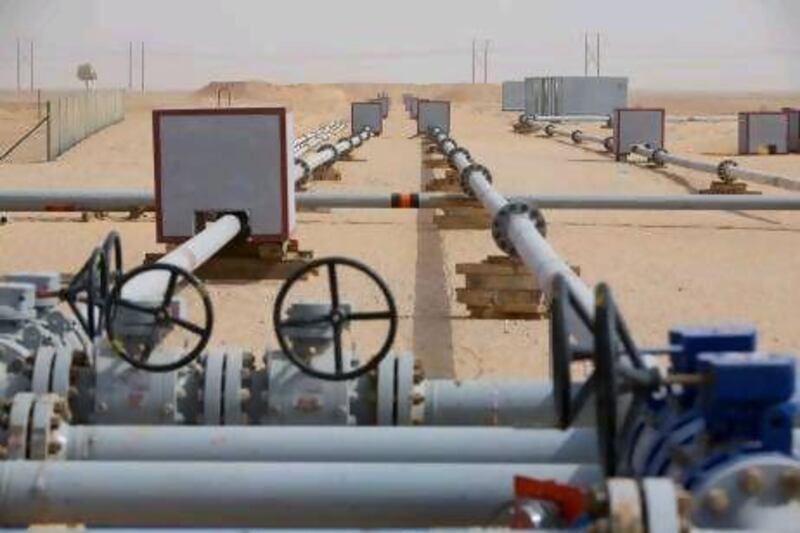Oil was slipping from Oman's grasp five years ago.
Unlike its neighbours Saudi Arabia and the UAE with giant fields of the kind that make oil majors salivate, Oman's reserves tend to be scattered in smaller deposits, ponds rather than lakes. Fields were reaching old age quickly, which translated into thick, sticky crude that needed expensive technology to get out. Between 2000 and 2007, production fell by more than 26 per cent from 972,000 barrels per day (bpd) to 714,800 bpd.
Now the narrative is shifting.
By the end of the year, Oman is set to become the first country in the eastern hemisphere to harness the sun's power to get oil out of the ground (see story below). It is negotiating with BP an estimated US$20 billion (Dh73.46bn) investment that would make it the first Middle East country to use hydraulic fracturing, the technique that has unleashed a natural gas windfall in the United States. And, as production has recovered to 930,000 bpd, Oman is the comeback kid of the oil world.
"It looks like the strategies we applied got results," said Nasser Al Jashmi, the undersecretary of the Omani oil ministry and a member of the board of Petroleum Development Oman, the state oil company. "And now our plan is to sustain this production for as long as we can."
Mr Al Jashmi chalks up the turnaround to a willingness to test frontier technologies such as fracking, as hydraulic fracturing is more commonly known, and injecting liquid polymers into heavy-oil fields to push the crude out.
The ministry also embarked on a marketing campaign to attract more foreign investors, broadening its base from just a few overseas players to more than 20 today. The list includes majors such as China National Petroleum Corporation, Total and Repsol, as well as smaller companies with UAE roots such as Mubadala Petroleum, a unit of Mubadala Development, a strategic investment company owned by the Abu Dhabi Government. DNO, a Norwegian operator part-owned by RAK Petroleum, is also on board.
It was also partly a matter of good timing, Mr Al Jashmi admits, as oil companies were enjoying a boom through 2008 with high crude prices and a strong economy churning out the extra cash they needed to bank investments abroad.
Oman is now expected to award two new concessions to foreign operators and it plans to finalise the arrangements for the fracking project next year.
Mark Carne, the regional executive vice president at Royal Dutch Shell, has followed Oman's story since he worked there in the early 1990s.
"It's almost a microcosm of what will happen in the Middle East and North Africa," he said.
"Oman is a very exciting example of how you can get much more from natural resources by bringing technology to bear and all countries in the region will come to this phase of life at some point. It's just Oman has had to tackle the challenges faster than others."
BP's fracking project at the Khazzan and Makarem fields is expected to produce at least 1 billion standard cubic feet of gas per day starting in 2017, a one-third increase on the nation's current production. The company is drilling horizontal wells 4,000 metres underground where it will pump in water and chemicals, cracking the rock to create channels for the gas to flow out.
"We are continuing with a comprehensive appraisal drilling and testing programme on the Khazzan project and we have confidence in our ability to deliver a material project," said David Dalton, the BP regional president. "Commercial discussions with the ministry of oil and gas are progressing and we're optimistic a declaration of commerciality for the Khazzan project will occur on schedule during 2013."
Fracking in the US has been so successful it has pushed gas prices to 10-year lows and promises energy independence that could rewrite its relationships across the globe. But it has also sparked resistance from environmentalists and local residents who fear the practice could contaminate groundwater or affect air quality.
In Oman, fracking will occur in the deserted central region and deep below freshwater formations, said Mr Al Jashmi.
"Very few people live there, or hardly any," he said. "It's safe, of course, if you apply all the measures and you follow the right procedures and techniques."
He is already seeking the next development in hydrocarbon technology.
"We are applying almost every technique. Whatever comes, we will apply it."





